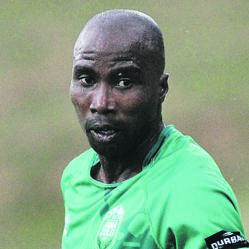Last week’s soccer drama involving the wearing of isiphandla has elicited strong reactions
Football often divides opinions, and last weekend’s incident at Sugar Ray Xulu Stadium in Clermont, KwaZulu-Natal, has added fuel to the fiery debates that fans of the beautiful game find themselves embroiled in.
It was not about what was happening on the field, but rather, off it.
Referee Jelly Chavani put his foot down and applied the laws of the game, ordering Golden Arrows players Siyabonga Dube and Sibusiso Sibeko to remove their iziphandla.
Now the big question is, what happens when football rules reject cultural tradition?
Should players be allowed to wear their iziphandla or any other accoutrements during matches, or should these all be banned?
Former referee Andile “Ace” Ncobo was unequivocal in his response: “The players must go back to their ancestors and tell them that they are involved in a sport that requires them to take off the isiphandla for the duration of the game.”
Mathole Motshekga, director of the Kara Heritage Institute, which aims to promote cultural awareness among Africans, disagreed: “It [isiphandla] is part of our indigenous religion and must be accepted as such. If you say that must be put aside, you are undermining our culture.”
As last weekend’s drama unfolded, Golden Arrows coach Steve Komphela and assistant coach Mandla Ncikazi were angered by the treatment of their two charges.
“This is Africa and cultures must be respected,” Ncikazi said.
“We cannot just remove iziphandla. Doing so can destroy the lives of the players wearing them and, besides, wearing them is part of our African culture. The rules of the game need to be reviewed in this regard. Banning them goes against our culture and rituals, and is disrespectful to the ancestors.”
DANGER
Ncikazi cited another reason for leaving the wrist bands on: “This can cause serious danger in the players’ lives. Isiphandla represents a connection to the ancestors. You cannot cut it off without informing the ancestors. It is worn to create a connection with them.”
Isiphandla, which is made from goat or cow skin, is worn for many traditional purposes by Africans as a way to connect with their ancestors.
“We told the referee that, even in the laws of the game, that has never happened before. I am worried about what will happen to the players because this has to do with them seeking protection from their ancestors,” ranted Ncikazi.
However, former award-winning Fifa referee Ncobo applauded Chavani for applying the rules, saying football is governed by the same laws the world over that must be applied and be respected by everyone.
“There are different cultures all over the world; imagine what would happen if the rules were to be changed to accommodate all of them. Laws of the game are there to govern us all. Whether we agree with them or not is immaterial.”
He said the rules used to be accommodating, but had now been refined and become more stringent.
“If Fifa says no jewellery, then no one can come and say that the rule does not apply to them because it goes against their culture. Some people may argue that wedding rings should be accommodated because they have the same or even higher significance.
“Like the saying goes: ‘If the mountain will not come to Muhammad, then Muhammad must go to the mountain.’ Culture must adapt and meet football halfway. People must accept that they are part of something that was never accepted before. They must say: ‘Let’s accommodate football within our culture.’”
Ncobo went on to suggest that footballers should make their ancestors understand that they were participating in a sport that required the isiphandla to be removed for the duration of the game.
“During our time as players, the rules were not clear, so there was leeway in the laws with regard to rings, stating that if rings did not pose any danger and were properly covered, then it was acceptable to play with them on. But the laws have been refined and we have to accept them as they are. Covering the isiphandla is not a solution, period.”
He advised match officials to be vigilant and not be intimidated by club officials or coaches.
“Rules are rules and are there for a reason. If you do not want to abide, then you do not belong to the game. It is as simple as that.”
However, Motshekga stuck to his guns. “These are Western rules and they should not be dictated to us.”
He said the Fifa laws were not universally applicable and could not be unilaterally enforced.
Motshekga said South Africa was a constitutional democracy and, as such, recognised all religions and cultural practices.
“In South Africa, we are governed by a constitutional democracy; a supreme law that recognises and allows people to practise their religion however they want to. Isiphandla is part of a sacrifice to the ancestors and is seen as an intermediary between people and God.
“The idea of forbidding items from being worn during matches is part of a Western mentality. This indicates that our education must be decolonised,” he said.
IT'S NOT FAIR
Recently retired striker Siyabonga Nomvethe recalls feeling the wrath of the laws of the game when he too was forced to remove his isiphandla during his spell with Kaizer Chiefs.
“I can’t recall the exact date or the referee at the time, but I was told that it was against the rules to play with my isiphandla on as it posed a danger to other players. The referee could not even allow me to wrap a bandage around it because it was hard. There was nothing I could do but cut it and play,” Nomvethe told City Press.
The former Bafana Bafana striker shares the views of those who are calling for a special provision for players with isiphandla.
“Isiphandla is part of our culture and I think it should be allowed on the field, provided that it is safely cushioned with a bandage. Not every piece can [be taken off] and put back on easily after a game, especially when it has dried up.”
During his spell abroad, Bhele said he hardly played with his cultural bracelet on.
“The referees would go as far as squeezing the bandage around the wrist to make sure that there was nothing underneath!” – Daniel Mothowagae
WHAT FIFA SAYS...
Safety is a key concern
A player must not use equipment or wear anything that is dangerous. All jewellery items (for example, necklaces, rings, bracelets, earrings, leather bands and rubber bands) are forbidden and must be removed.
Using tape to cover jewellery is not permitted.
The players must be inspected before the start of the match, as must substitute players before they enter the field of play.
If a player is wearing or using unauthorised/dangerous equipment or jewellery, the referee must order the player to:
- remove the item; or
- eave the field of play at the next stoppage if the player is unable or unwilling to comply.
A player who refuses to comply or who wears the item again must be cautioned.
What do you think of the wearing of cultural items in a professional sport? Should it be accommodated within the rules of sport?
SMS us on 35697 using the keyword CULTURE and tell us what you think. Please include your name and province. SMSes cost R1.50. By participating, you agree to receive occasional marketing material




 Publications
Publications
 Partners
Partners










